 Petzlover
Petzlover Akita is originated from Japan but Kyi-Leo is originated from United States. Akita may grow 40 cm / 16 inches higher than Kyi-Leo. Akita may weigh 48 kg / 106 pounds more than Kyi-Leo. Both Akita and Kyi-Leo has same life span. Both Akita and Kyi-Leo has same litter size. Akita requires Low Maintenance. But Kyi-Leo requires Moderate Maintenance
Akita is originated from Japan but Kyi-Leo is originated from United States. Akita may grow 40 cm / 16 inches higher than Kyi-Leo. Akita may weigh 48 kg / 106 pounds more than Kyi-Leo. Both Akita and Kyi-Leo has same life span. Both Akita and Kyi-Leo has same litter size. Akita requires Low Maintenance. But Kyi-Leo requires Moderate Maintenance
 Akita is a very old breed. The first information originates back in the 1600s. Akita was a royalty guard and a hunting dog. They were popular because of their bravery. Akita even attacked bears. Helen Keller brought the first Akita to America. She admired the breed because of the famous Hachiko, a dog that was known for his loyalty. Today, Akita is a popular dog in the whole world. They are lovely family pets, and if train properly they will be adorable part of any family.
Akita is a very old breed. The first information originates back in the 1600s. Akita was a royalty guard and a hunting dog. They were popular because of their bravery. Akita even attacked bears. Helen Keller brought the first Akita to America. She admired the breed because of the famous Hachiko, a dog that was known for his loyalty. Today, Akita is a popular dog in the whole world. They are lovely family pets, and if train properly they will be adorable part of any family.
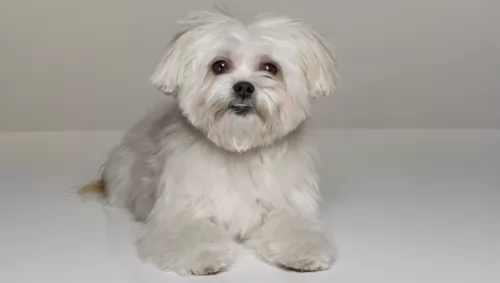 The Kyi-Leo first came about in the 1950s in San Francisco, USA, with the crossing of two dog breeds – the Lhasa Apso and the Maltese.
The Kyi-Leo first came about in the 1950s in San Francisco, USA, with the crossing of two dog breeds – the Lhasa Apso and the Maltese.
Because this is a mixed-breed dog, it isn’t recognized by the American Kennel Club, but it is recognized by some of the other dog associations such as the American Rare Breed Association or ARBA as it is known. Today the dog is looked upon as a designer breed.
 Akita’s average weight is 34-54kg, while their height is 58-66cm. Females are smaller than males.
Lifespan variates from dog to dog but an average lifespan of Akita is 11-15 years. However, if you take care of your dog with a proper diet and regular vet checks they can live longer than average.
Litter Size of Akita is 7-8 puppies, but again, litter size variates because of dog’s genetics.
Other Names for Akita are Akita-Inu and Japanese Akita.
Akita’s average weight is 34-54kg, while their height is 58-66cm. Females are smaller than males.
Lifespan variates from dog to dog but an average lifespan of Akita is 11-15 years. However, if you take care of your dog with a proper diet and regular vet checks they can live longer than average.
Litter Size of Akita is 7-8 puppies, but again, litter size variates because of dog’s genetics.
Other Names for Akita are Akita-Inu and Japanese Akita.
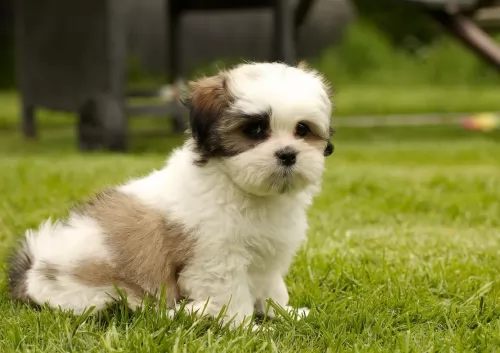 The Kyi-Leo is a small dog standing at 20 – 30cm in height and weighing in the region of 4 – 6kg.
The Kyi-Leo is a small dog standing at 20 – 30cm in height and weighing in the region of 4 – 6kg.
He has a long, silky coat which is essentially black and white or grey/silver and white or even gold and white. He has frail legs which can become injured or broken in vigorous rough and tumble games.
You can certainly describe the Kyi-Leo as a sweet, quiet, non-aggessive playful dog, and for anyone who wants a splendid pet and companion, this dog makes a great family pet and he won’t cost you an arm and a leg to feed either.
He also has an acute sense of hearing and this turns him into an excellent ‘alarm’ watch-dog. It is also a dog, that while he will love to join you on a walk, he isn’t a dog that is going to demand a lot of exercise.
He responds well to his human family, is easy-going and gentle, tending to be cautious around strangers. You can trust him to be an awesome playmate for children. In this instance, it’s the children who should be warned when playing with a dog like this as, because of his fragile build, he could easily be injured by children who haven’t been taught to respect animals.
Even though he is such an amicable pet, it will still be of benefit to you and him to have him trained and socialized. Then he responds well to basic commands such as sit, stay and lie-down.
Dogs who spend time with their family, pick up on the ‘culture’ of the family and they learn how to behave. Dogs who are left on their own and never socialized can become nervous and aggressive towards people as they never got to learn how to behave – they weren’t socialized.
 Akita is a very elegant breed. They are very strong and fast, so they had been excellent guards. They sometimes can be stubborn, but they are very loyal to the family. Akita has tendencies to be aggressive to other dogs. Because of their dominant character, they can be especially aggressive towards the same sex. They are the best for one-dog houses. With family, they are very loving and gentle. The best way to train Akita is by positive training with awards. The old-fashioned way like punishing is not recommendable. Constant and firm training is important, so if you are first time owner, it might be a big challenge. If you are first time owner, consider advising with a trainer who knows the breed.
Akita is a very elegant breed. They are very strong and fast, so they had been excellent guards. They sometimes can be stubborn, but they are very loyal to the family. Akita has tendencies to be aggressive to other dogs. Because of their dominant character, they can be especially aggressive towards the same sex. They are the best for one-dog houses. With family, they are very loving and gentle. The best way to train Akita is by positive training with awards. The old-fashioned way like punishing is not recommendable. Constant and firm training is important, so if you are first time owner, it might be a big challenge. If you are first time owner, consider advising with a trainer who knows the breed.
Akita loves to be around family and to be included in family activities. They do not need a lot of activity, but daily routines of one-hour walks or jogging would be ideal for Akita. Visiting parks for dogs is not a good idea because of aggressive attitude towards other animals. If Akita does not have activities they can get bored, and you do not want bored Akita. When bored they start barking, digging, chewing, and sometimes even aggressive. Overall, they are very loving and gentle dogs who love to be around family and enjoy activities. But, they also need proper care and attention which require time and patience.
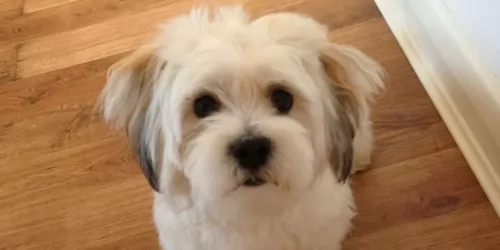 The Kyi-Leo is everything you want in a family companion – active, playful, loving, gentle, happy and balanced.
The Kyi-Leo is everything you want in a family companion – active, playful, loving, gentle, happy and balanced.
He loves his human family but tends to be a little bit wary around strangers, gradually warming to them.
He may be small, but he is robust and alert, and he is also capable of making you a good watchdog.
The Kyi-Leo is an all-round great little pet to have.
 Akita is a very healthy breed in general. Nevertheless, almost as every breed, Akita can develop health issues. Hip dysplasia, hypothyroidism, Progressive retinal atrophy are some of the issues Akita might have. Although, if you give your puppy Akita necessary vitamins, with a healthy diet and regular vet checks, it will a very happy and healthy dog. It is also important to know the genetics of your dog, so carefully choosing a puppy is very important.
Akita is a very healthy breed in general. Nevertheless, almost as every breed, Akita can develop health issues. Hip dysplasia, hypothyroidism, Progressive retinal atrophy are some of the issues Akita might have. Although, if you give your puppy Akita necessary vitamins, with a healthy diet and regular vet checks, it will a very happy and healthy dog. It is also important to know the genetics of your dog, so carefully choosing a puppy is very important.
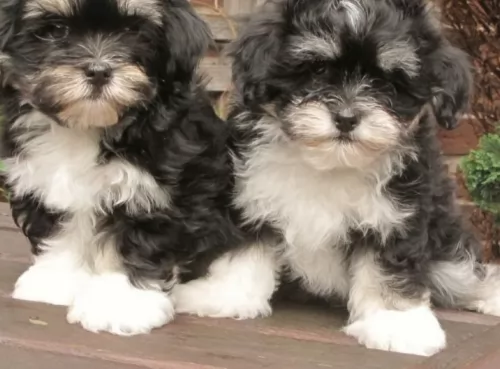 Your Kyi-Leo is such a feisty, robust little dog who is not likely to cost you much in terms of health care. With his frail legs, it is a good thing to know that you need to be careful with him in terms of back-and joint problems.
Your Kyi-Leo is such a feisty, robust little dog who is not likely to cost you much in terms of health care. With his frail legs, it is a good thing to know that you need to be careful with him in terms of back-and joint problems.
There are actually knee joint issues which are fairly common in small dogs, one of which is patellar luxation.
This is where the kneecap pops out of the thighbone, causing the dog to skip or hop. Some joint issues are genetic and may require surgery. Make sure to keep your pet’s weight under control to remove additional stress on the joints.
This is another dog illness you want to be careful with. Acute pancreatitis -inflammation - is when the condition comes on suddenly while chronic pancreatitis is when pancreatitis occurs over a period of time.
With acute pancreatitis in dogs you’ll see symptoms such as vomiting, abdominal pain, tremors and reluctance to eat. Pancreatitis can be brought on by too much fat, especially rancid fat, some anti-biotics, a low protein diet or a sickness such as diabetes.
If you suspect pancreatitis in your dog, get him as quickly as possible to the vet.
 It is always important to adjust feeding to size, activity age and built. Dogs who are bigger and have more activity will need more food. For an average Akita 3-5 cups of dry high-quality food, divided into 2 meals will be enough. They also love to eat vegetables like carrots, broccoli, and fruits like apples, oranges, watermelon, etc.
It is always important to adjust feeding to size, activity age and built. Dogs who are bigger and have more activity will need more food. For an average Akita 3-5 cups of dry high-quality food, divided into 2 meals will be enough. They also love to eat vegetables like carrots, broccoli, and fruits like apples, oranges, watermelon, etc.
Akita puppy should have more meals per day plus additional calcium and vitamins. 3-5 meals per day would be an ideal for a puppy. It is a perfect way to develop your puppy into a healthy adult dog.
Grooming Akita is not the worst, but it will require some work. They have a double coat, but they are shedding a lot. Occasional vacuuming will be a new habit that every Akita owner needs. They shed 2-3 times per year, so it is not very bad. When it not shedding, everyday brushing would be a perfect way to groom your Akita.
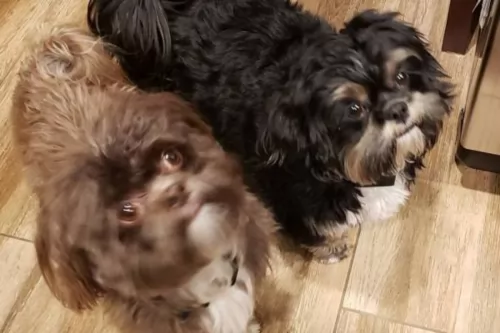 The Kyi-Leo doesn’t require vigorous exercising. One walk a day will keep them happy. There are pet owners who believe dogs can be permanently outside dogs where they can do their own exercise.
The Kyi-Leo doesn’t require vigorous exercising. One walk a day will keep them happy. There are pet owners who believe dogs can be permanently outside dogs where they can do their own exercise.
Everybody who knows dogs, knows they are social creatures who will simply lie at your backdoor just waiting for some response from their beloved human family. Every dog, regardless of breed or size, needs exercise and interaction with their humans every day.
Dogs left alone in the yard day after day are loney, frustrated and bored, and when they start digging or barking, irresponsible owners will ill treat them. These kind of people should never own a dog.
The Kyi-Leo has a sensitive stomach so he’ll need good quality food to avoid digestive problems. Ideally home-cooked food such as softly boiled chicken, brown rice and raw or cooked vegetables added into top quality kibble is the preferred diet.
Fresh, cool water needs to be constantly available.
Brush the long, silky coat at least twice a week to ensure it remains free of knotting. Brushing keeps the coat shiny too.
As a long eared dog, ears should be checked and cleaned regularly too. Air doesn’t reach the inside of their ears and the warm dampness in the ears are a breeding place for infection.
Nails should also be trimmed when they become long because left uncut they can hook onto things causing injury ad pain.
Small dogs are more prone to tartar formation and loss of teeth. You’ll notice that something isn’t right because your lively little dog will be lethargic, he may not want to eat his food and his face may be swollen. When you suspect dental problems, get him to the vet.